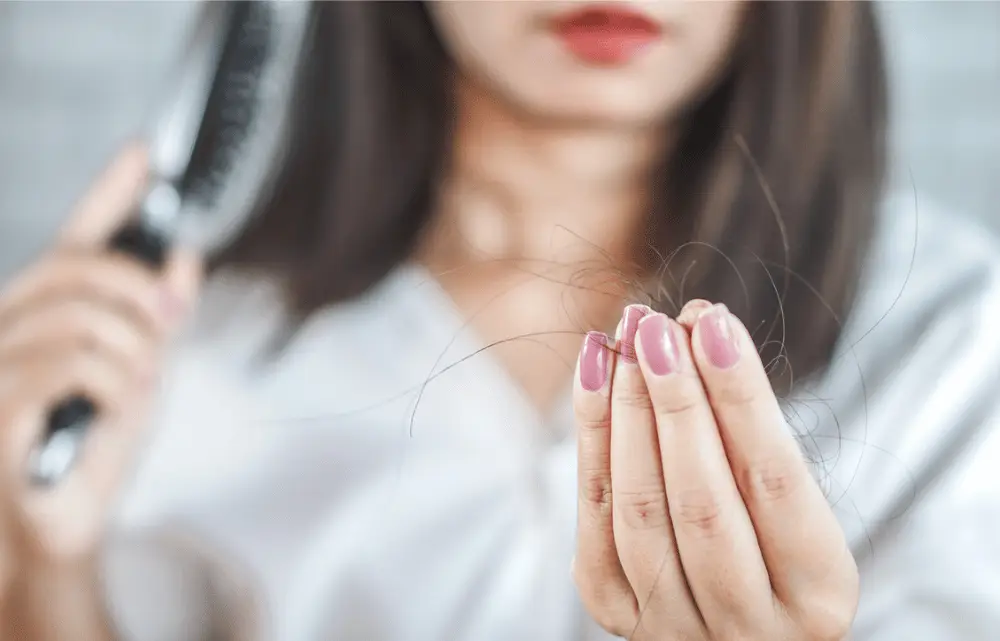Hair Loss in Women is More Common Than You May Realize. Fortunately, it Doesn’t Have to be Permanent.
Hair loss in women is as simple as it sounds: you experience an unexpected and heavy loss of hair. And while most people think hair loss happens mostly for men, that’s not the case: More than 50% of women will experience hair loss in their lifetimes. Many women will notice their hair thinning over time, but others will see sudden hair loss.
Regardless of how fast or slow you lose hair, the experience can be extremely troubling — not just because it can affect your self-esteem and confidence, but also because it could mean an underlying physical condition that hasn’t been addressed.
Often, hair loss is caused by hormone and nutritional deficiencies, which we can correct once we determine the exact cause.
Signs of Hair Loss
- You notice more hair falling out daily, either on your brush, on the floor, in the shower, on your pillow, or in the sink.
- You’re seeing scalp skin through your hair.
- You have patches of thinner or missing hair. This can include the part on the top of your head getting wider.
- Your ponytail is smaller than it used to be.
- You see your hair break off.
- You may see hair loss similar to male-pattern baldness.
If you notice or think you’re losing more hair than you should, it’s vital to discover why it’s occurring.
What Causes Hair Loss in Women?
Several things can cause female hair loss, including:
- Extreme physical or emotional stress, whether sudden or chronic. This can include life events like the death of a loved one or a divorce. It can also include things like rapid weight loss, surgery, and having a baby.
- Hypothyroidism or Hashimoto’s disease.
- Perimenopausal or menopausal hormone imbalances.
- Genetics can cause the hair on the top of your head to thin out.
- Eating a poor diet, including too much sugar and processed food, as well as restrictive diets where you don’t get enough nutrition.
- Iron deficiency or anemia, as well as low vitamin B12 levels.
- Autoimmune disorders and other serious illnesses.
Hair loss can also be caused by toxic substances, including chemotherapy, radiation therapy, and some medications, such as blood pressure drugs. You can also experience hair loss if your hairstyle is arranged in ways that pull on your roots, such as tight ponytails, braids, or corn rows.
Often, the cause can be hard to pinpoint because the hair may not start falling out right away. That’s why it’s so vital to get comprehensive testing to discover what’s at the root of your hair problems.
Thyroid Disorders
Thyroid disorders are another key reason women lose hair. And it’s not just because of the thyroid problem itself: The thyroid is a master gland in the body. As such, it regulates other hormones and physiological processes and can be at the root of other diseases, which can also cause hair loss. Hashimoto’s disease, for example, is an immune system problem that affects the thyroid gland and also causes hair loss.
In Hypothyroidism, there isn’t enough thyroid hormone to meet the body’s needs. Sometimes, there’s enough of the T4 hormone (the inactive form), but cells can’t convert the T4 into the T3 hormone, which is the active form. Your body needs T3 to produce energy in the mitochondria, which are the energy “powerhouses” in the cells. So, if there’s not enough energy to go around, it will be directed to the most important areas of your body: the vital organs and life-sustaining systems. As a result, less energy will go to hair follicles, since hair isn’t a vital bodily process.
Additionally, if your thyroid isn’t operating well, your digestive process can slow down. And this can prevent the absorption of vitamins and minerals. This is particularly important with iron, as this mineral is critical for producing hemoglobin in red blood cells. Red blood cells carry oxygen, and if the hair follicles don’t get enough oxygen, it can lead to hair loss.
Other Hormonal Conditions
The thyroid isn’t the only gland that can contribute to losing hair. Your endocrine system comprises many hormone-producing glands, of which the thyroid is a part. And if something throws the endocrine system out of balance, it can create various hormonal conditions, some of which can lead to hair loss. These conditions include:
- Insulin resistance
- Adrenal fatigue
- Testosterone imbalance
- Estrogen dominance or estrogen deficiency
- Progesterone deficiency
So, if you’re experiencing hair loss, it’s vital to determine if you have a hormonal imbalance and get it corrected.
Nutritional Deficiencies
Many times, deficiencies in nutrition can contribute to hair loss. Certain vitamins and minerals are crucial to healthy hair growth. These include iron, as mentioned above, but also iodine, selenium, zinc, vitamin A, vitamin B7 (biotin) and other B vitamins, and magnesium. Also, essential fatty acid and protein deficiencies can lead to hair loss.
Nutritional testing can help determine if you have a deficiency that could be contributing to your hair loss. Also, eating well and exercising regularly can definitely help combat hair loss.
Hair Loss Doesn’t Have to be Permanent. The Providers at Forum Health Can Help!
The good news is that once we identify the root cause of hair loss, your hair will likely start growing back in. And there are many hair growth products on the market, such as minoxidil, which can help grow back hair. Unfortunately, this may be a temporary solution; if you haven’t identified the root cause of your hair loss, it may happen again.
If you are struggling with hair loss, our providers are here to help. We understand how hormonal imbalances affect hair loss and overall health, and we use a science-based, holistic approach to your health and treat you as an individual so you can look and feel your best.
We can provide answers and offer solutions so that you can restore your health and live a vibrant life. Our appointments with you last an hour so that we’re able to provide you with quality support, guidance, and the tools you need in order to succeed.
Our providers are devoted to understanding your health concerns and symptoms. We use scientific-based protocols to find the root cause of hormonal imbalances, thyroid dysfunction, nutritional deficiencies, and more.
We believe that spending quality, personalized time with each patient provides the foundation to help you achieve optimal health and wellness. Our system incorporates provider consultation, comprehensive health assessment, and laboratory testing in a warm and caring environment.
Contact us to learn more about how we can help you. We can explain our protocols and fees in more detail, answer any questions or concerns you have, and explain how our approach can help you get to the root of your hair loss. We want you to enjoy a vibrant and healthy life!






